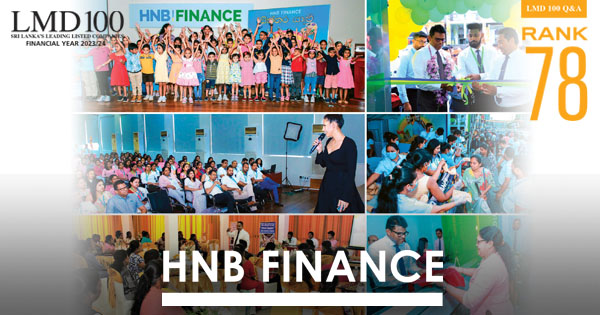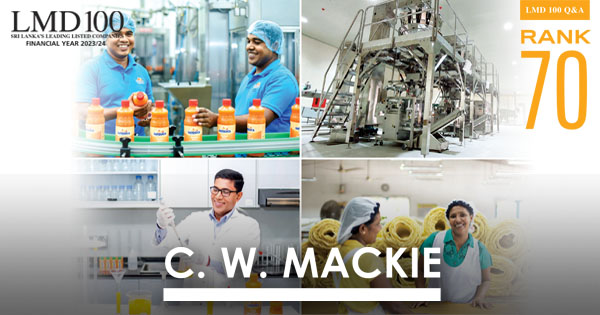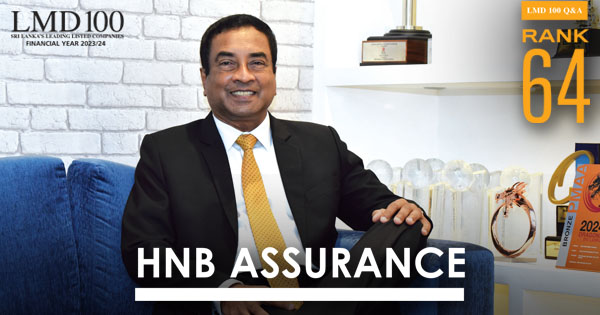LMD 100 Q&A
SUNSHINE HOLDINGS
Q: What is the role of corporates in Sri Lanka’s economic revival – especially given the multiple crises that our nation has faced in recent times?
A: Right now, we are facing an economic contraction and corporates are the second largest employer after the government. So they have to make sure that employment is stable and businesses continue growing. They are also struggling to keep afloat – with lots of challenges such as inflation at 70 per cent, 10 per cent economic contraction and 30 per cent interest costs. It’s not easy to conduct business in this environment.
Therefore, the first priority of corporates will be to survive these negative headwinds; and secondly, to ensure that their employees are looked after through this period – and all of this while remaining stable and looking for new opportunities.
Amidst all of this, there is also a scarcity of food. While the government is grappling with the issue, the export sector can play a greater role by making sure that we increase our exports significantly to increase the inflow of foreign currency to the island.
The ongoing economic crisis started with a lack of foreign currency in the country. Even to buy a basic commodity such as fuel, we need foreign currency. Therefore, the export sector is very important indeed.
Overall, entities in the corporate sector have to reduce expenditure and tighten their belts. Higher taxes are also the need of the hour as there is no other way to increase revenue for the government.
Q: How can Sri Lanka improve its ease of doing business and competitiveness on the international stage?
A: Firstly, we have to demonstrate to the world that we are stable as a country. Unfortunately, there is great stigma associated with us due to our poor standing on the corruption index – we need to eliminate this.
Another aspect that needs to be addressed immediately is the absence of a single window for foreign investors. This needs to be remedied so that foreign investors don’t have to go from pillar to post to obtain the required approvals.
Secondly, we need to be digitally driven. In most parts of the world, everything from registering a business through filing a tax number to obtaining a licence can be done online. We need to move in this direction.
Finally, our people need to be held accountable. For example, we have multiple ministries to get one job done. A certain quantum of rationalisation needs to be introduced.
Most developing countries have gone through this cycle – so we need to study those nations and adopt the good practices of states like Singapore. I’m sure they’ll be very happy to help us!
Even our neighbour India, which has made a big name for itself, has been able to attract large amounts of foreign direct investments (FDI). This can’t be done without the ease of doing business being high.
If major conglomerates such as Microsoft, Google and Apple can invest in a country governed by a bureaucracy such as in India, this means that they have done something right – and we can definitely learn from them.
Q: How has your sector been impacted by the country’s economic climate? And what are the group’s medium-term priorities?
A: We are in the healthcare, agriculture and consumer goods sectors. Healthcare is a primary and necessary commodity – so there has been no ban on imports. However, getting the dollars to import is a huge challenge. All businesses are facing this issue.
Banks tend to prioritise healthcare because medicine is a lifesaving product. On the other side however, suppliers who generally give us a huge amount of credit have reduced it significantly due to our current credit standing.
In consumer goods, we are generally doing well enough. But there are some raw materials – such as sugar – that are needed for confectioneries, which have gone into temporary import suspension.
We are quite bullish about our agribusiness even though we had some setbacks with fertiliser. But this is all a part of doing business in Sri Lanka – every day is a new one and we have to learn to live with it.
In the medium term, the first priority is to survive the next 18 months and try to preserve cash without going into debt. The next is always to make sure that your customers are taken care of. That’s all we can look forward to for now.
Q: How has the role of the end consumer changed in the face of the present economic turmoil in Sri Lanka and around the world? And how are corporates responding to these changes?
A: Customers are facing challenges as much as corporates. The take-home value of money is a lot – but you take away less in the marketplace. Therefore, they’re limited in what they can buy and have to impose budgets on themselves as regards the necessary goods. People will first spend on food, medicine and childcare; and only then look to other goods.

Group Managing Director
The prices of everything have increased. If corporates are not able to reduce prices, not increasing the same is in itself a huge benefit for consumers. How corporates can help customers is limited, other than by making sure different options are available to them.
In healthcare, we always like to have a variety of brands available. But due to our rupee’s depreciation, the cost of medicine has gone up. So people with noncommunicable diseases such as diabetes or high blood pressure, which need long-term medication, are unable to buy their regular doses.
We are working with various departments to make sure we bring in the necessary medicines as best we can. But the overall economic conditions have to change for things to normalise.
Q: What is the level of technology integration in your sector?
A: We as a company have been continuously investing in digital technology but still have a long way to go to be on par with the rest of the world. More than investments, our people need to accept and adopt technology. Having access to data allows you to analyse and make better decisions. Right now, the impediment is in the willingness to use these data.
Q: What are your group’s plans with regard to expansion?
A: We would like to expand our offerings to customers especially in our consumer goods segment. We are actively looking to see what other consumer products we can introduce to the market. With the current food scarcity, we want to play a lead role as a food provider for the country in the future.
In the healthcare sector, we have begun manufacturing some products locally. We would like to expand this as well.








